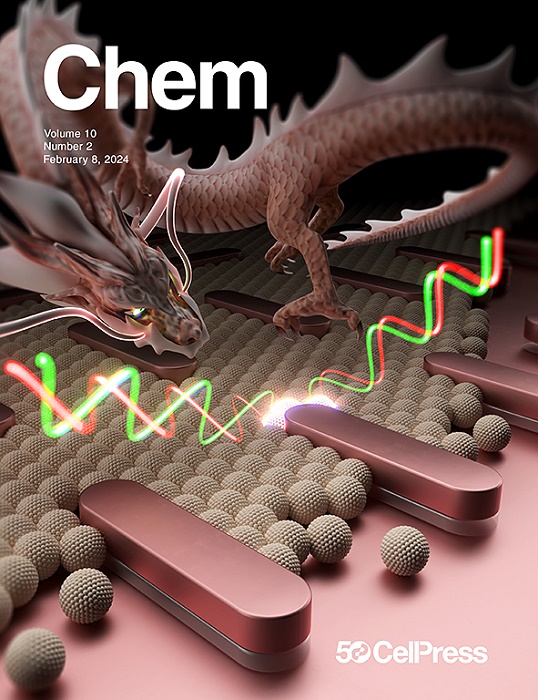走向合成生命——依赖燃料的合成细胞的出现、生长、后代的创造、衰变和拯救
IF 19.6
1区 化学
Q1 CHEMISTRY, MULTIDISCIPLINARY
引用次数: 0
摘要
从无生命物质中重新合成生命是一项大胆的科学挑战,它促进了我们对生命最低要求的理解,并为生物技术提供了革命性的应用。我们探索基于复杂凝聚液滴的燃料依赖合成电池,它没有膜,很容易吸收反应物。鉴于它们依赖燃料的性质,这些液滴在燃料充足时出现并生长,但在饥饿条件下溶解,模仿生命的非平衡性质。然而,它们繁殖后代的能力——这是生命的关键要求——仍然难以捉摸。此外,它们在重复的燃料饥饿实验中的拯救作用尚未得到证实。我们的工作阐明了一种由释放出来的液滴中的固体状斑点驱动的合成细胞产生后代的机制。通过微调参数,我们可以控制后代的数量和存活率。最后,补充能量维持第二代合成细胞。这个系统为后代的产生和自我复制分子的结合提供了一个平台,为能够进行达尔文式进化的合成细胞铺平了道路。本文章由计算机程序翻译,如有差异,请以英文原文为准。


Toward synthetic life—Emergence, growth, creation of offspring, decay, and rescue of fuel-dependent synthetic cells
The de novo synthesis of life from non-living matter represents a bold scientific challenge, advancing our understanding of life’s minimal requirements and offering revolutionary applications in biotechnology. We explore fuel-dependent synthetic cells based on complex coacervate droplets, which lack membranes and readily take up reactants. Given their fuel-dependent nature, these droplets emerge and grow when fuel is abundant but dissolve under starvation conditions, mimicking the non-equilibrium nature of life. However, their ability to produce offspring—a key requirement for life—has remained elusive. Moreover, their rescue in repetitive fueling-starvation experiments has not been demonstrated. Our work elucidates a mechanism of producing offspring by synthetic cells driven by solid-like speckles in droplets liberated as offspring. By fine-tuning parameters, we control offspring number and survival. Finally, refueling sustains second-generation synthetic cells. This system provides a platform for coupling offspring production with self-replicating molecules, paving the way for synthetic cells capable of Darwinian evolution.
求助全文
通过发布文献求助,成功后即可免费获取论文全文。
去求助
来源期刊

Chem
Environmental Science-Environmental Chemistry
CiteScore
32.40
自引率
1.30%
发文量
281
期刊介绍:
Chem, affiliated with Cell as its sister journal, serves as a platform for groundbreaking research and illustrates how fundamental inquiries in chemistry and its related fields can contribute to addressing future global challenges. It was established in 2016, and is currently edited by Robert Eagling.
 求助内容:
求助内容: 应助结果提醒方式:
应助结果提醒方式:


